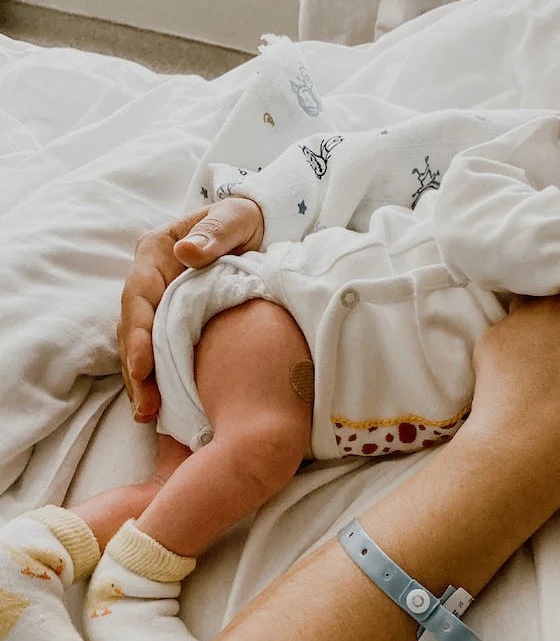
Childbirth is no easy feat. Many of us stress the importance of prenatal and pregnancy care and sometimes neglect the postpartum period. It’s important to treat the body with the same care you did during pregnancy after you’ve given birth. Whether cesarean or vaginal delivery, breast or bottle feeding, the demands of the postpartum period are enormous, and I’m here to encourage you to be gentle and patient with yourself as your body continues to change.
The lesser known and infrequently discussed fourth trimester is another way of referring to the 12 week postpartum period after giving birth. There are a lot of big changes during this time— both emotionally and physically. It’s common for women and their partners to experience lack of sleep, fatigue, stress, depression, and more. You may be breastfeeding, which can cause frustration, pain, and discomfort. Postpartum hair loss is also a common occurrence and concern for many new moms. Not to be entirely pessimistic, as the fourth trimester is also a great time to bond with your baby and treat yourself to much-deserved self care.
Recovering from childbirth will look different for everyone, but the general consensus is that it has its own unique challenges. Here are some must-have postpartum care products every new mom needs:
There will likely be bleeding and discharge the weeks after you give birth, which is known as lochia. This is a normal part of recovery and is often a heavy flow for at least a few days. You’ll want plenty of menstrual pads on hand since tampons are a no-go until they’ve been cleared by your healthcare provider.
Especially if you’re breastfeeding, nutrition is vital for your recovery and health. The CDC recommends consuming an additional 400-500 calories a day while breastfeeding to make up for the nutritional demands. It’s also important that your diet is full of vitamins and minerals to encourage healing and growth. Data shows that a postnatal vitamin can improve the quality of breast milk and help with the maintenance of hair, skin, and nails post birth. If you’re especially concerned about postnatal hair loss, consider a biotin supplement* to support hair and skin health.
Not only is your bleeding going to be pretty heavy after giving birth, but you will likely be sore and swollen for a while. Consider buying a pack of comfortable cotton underwear that you don’t mind getting dirty, in case you bleed through your pads. You may also want to consider period underwear, designed to soak up excess blood.
Sore, cracked nipples are a common occurrence for many while breastfeeding and postpartum. Natalist Nip & Lip Balm has been formulated specifically for pregnant and postpartum moms to use on dry nipples and lips. It’s safe for breastfeeding, meaning you don’t need to remove it between feedings, and it’s made without parabens and phthalates!
Staying hydrated is vital for a smooth recovery and ample milk supply! Research shows that staying hydrated may help prevent constipation, regulate body temperature, promote more restful sleep, and cushion your joints. We also know that breast milk is about 90% water, so high water intake = improved milk supply. If you’re breastfeeding, a good rule of thumb is to try and drink a glass of water every time you nurse. Here are some tips on staying hydrated while breastfeeding.
It’s normal to experience constipation, hard stool, and other uncomfortable symptoms after pregnancy. Fiber supplementation and plenty of fluids can be a great way to prevent constipation and help soften stool. Check out this recipe for a fiber-full smoothie!
You’re likely to experience some swelling or discomfort after giving birth in the vaginal area, abdomen, or breasts. Having ice packs and a heating pad on hand can be great for relieving the aches associated with sore boobs and other areas.
A vital part of hygiene following childbirth is the use of a perineal irrigation bottle, or a peri bottle. The perineum is the area between the vagina and the anus, an area that tears in about 80% of vaginal deliveries. There is often stitching along the perineum after childbirth that needs to be kept clean. Peri bottles come in handy for rinsing the area frequently to help keep the area clean as well as ease any burning or discomfort. Read about how to perform perineal massage to prevent tearing during childbirth.
Taking magnesium after childbirth has a lot of benefits. Magnesium already plays a huge role in keeping our bones strong, energy production, and supporting muscle and nerve function. It’s especially helpful during postpartum periods, as research shows magnesium supplementation encourages hydration and sleep support. Some data also suggests that magnesium may help prevent negative symptoms associated with postpartum preeclampsia. Magnesium Plus drink mix is a raspberry flavoured mix perfect for supplementing magnesium and supporting relaxation!
A sitz bath is a shallow bath useful for relieving a painful and sore perineum. Soaking the area in warm water can help increase blood flow and promote healing and pain management. Combine this with an ice pack or heating pad and any approved pain relievers and you should find some relief from perineal pain.
Pregnancy and childbirth both require a lot of life adjustments, sleepless nights, bodily changes, and more. Give yourself the time you need to heal, and put together a postpartum essentials kit for yourself to make sure you have all the items you need for a successful recovery. After all, you’ve nurtured and delivered a tiny human; you got this, mama!
* Be sure to speak with a healthcare provider before taking any supplements or medications, especially when breastfeeding.
Sources:
https://www.acog.org/clinical/clinical-guidance/committee-opinion/articles/2018/05/optimizing-postpartum-care
https://my.clevelandclinic.org/health/symptoms/22485-lochia
https://pubmed.ncbi.nlm.nih.gov/27534637/
https://www.cdc.gov/breastfeeding/breastfeeding-special-circumstances/diet-and-micronutrients/maternal-diet.html
https://www.ncbi.nlm.nih.gov/pmc/articles/PMC6715334/
https://americanpregnancy.org/healthy-pregnancy/breastfeeding/breastfeeding-overview/
https://www.cdc.gov/healthyweight/healthy_eating/water-and-healthier-drinks.html
https://bmcpregnancychildbirth.biomedcentral.com/articles/10.1186/s12884-020-03447-0
https://www.mayoclinic.org/healthy-lifestyle/nutrition-and-healthy-eating/expert-answers/magnesium-supplements/faq-20466270
https://pubmed.ncbi.nlm.nih.gov/8879973/#
https://pubmed.ncbi.nlm.nih.gov/34883514/
https://my.clevelandclinic.org/health/treatments/24137-sitz-bath

Dr. Kenosha Gleaton is board certified in gynecology and obstetrics and is the Medical Advisor of Natalist. She received her MD from MUSC and completed her residency at Carolinas Medical Center in Charlotte, NC.
Dr. Gleaton is passionate about women, youth, and mentoring. She is a Scrubs Camp instructor, a program to increase student entry in healthcare, and serves as a Compassion International adoptive parent. She is also a member of the American College of Obstetrics & Gynecology, the American Association of Gynecologic Laparoscopists, and the American Association of Professional Women.
In her spare time, she enjoys running and spending time with her husband, Dr. Douglas Gleaton, and her sons—Douglas III and Parker. You can follow Dr. Gleaton on Instagram @drkgleaton.



Comments (0)